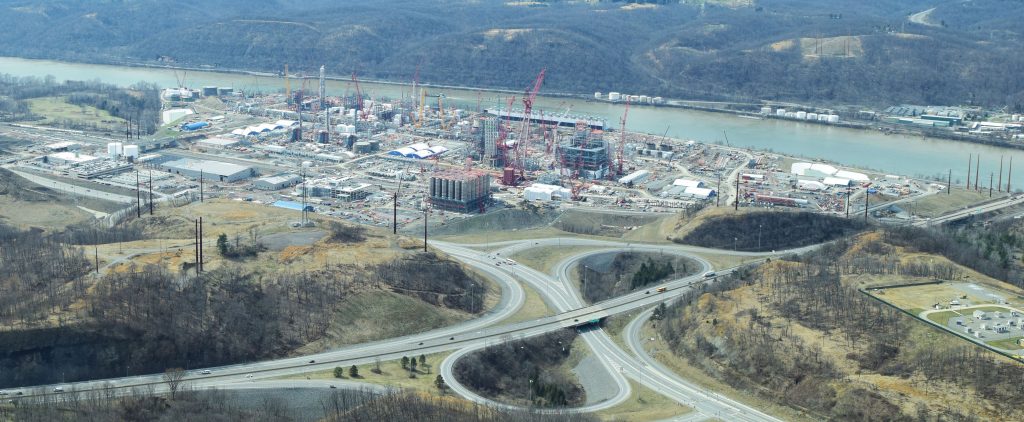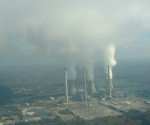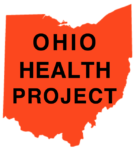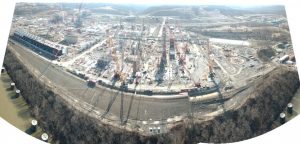
The Shell cracker plant under construction near Beaver, PA. This huge industrial facility is one of five or more such plants that would be part of the proposed Appalachian Storage Hub/petrochemical complex. This 4/2/2019 photo is courtesy of Ted Auch PhD, Great Lakes Program Coordinator, FracTracker Alliance, fractracker.org/photos.
A study recently published in the Oxford Research Encyclopedia of Global Public Health looked at several hundred scientific articles about the health impacts of fracking, eliminating any that didn’t hold up to scientific rigor. Their conclusions can be summarized by this sentence: “Fracking has been linked to preterm births, high-risk pregnancies, asthma, migraine headaches, fatigue, nasal and sinus symptoms, and skin disorders…” Read an article about the study here.
Okay, so it’s dangerous to your health to live where a lot of drilling and fracking are going on. But what about other parts of the natural gas industry? DeSmog Blog takes up this question in an article that covers so much it can scarcely be summarized; I just have to urge you to read it. Wow. Looks pretty bad all around: all the links of the industrial chain are hazardous to health. And all of them will exacerbate climate change.
As if all that were not enough, this infrastructure all may well end up as stranded assets, given the expansion of plastic manufacturing in the Gulf region already known as Cancer Alley and in China… and the burgeoning movement to ban single use plastic which is 40% of the market. Is there really going to be a market for a huge global expansion of plastic production, when the world is becoming aware of the ecological and health hazards of plastic waste? And the risks of catastrophes like what happened during Hurricane Harvey (see the video link in the aforementioned DeSmog blog). And the water pollution with its threats to wildlife and drinking water downstream. And the risks of pipeline explosions or fires.
Most importantly, all the proposed new infrastructure (such as the Appalachian Storage Hub) is intended to be used for several decades, well into the period when averting climate catastrophe requires us to not just reduce but eliminate greenhouse gas emissions. So this is backward development, hearkening back to the 1950s instead of moving to newer, cleaner, renewable resources.
So—should the governments of the Ohio Valley region support the proposed ASH petrochemical complex? Pretty much of a no-brainer, right? All that harm—not even mentioning turning our cool, forested riverine valley into a hideous industrial zone—and all we get are some jobs that the industry may eliminate with automation, as reported here, and also some revenue for states and localities via taxes. Except that the companies always seem able to lobby for big reductions in their taxes. The first cracker plant, under construction near Pittsburgh, has been granted a $1.65 billion subsidy by the state of Pennsylvania. Yes, with a B. For one plant, which is supposed to provide 600 jobs. That’s $2.75 million per job, paid by the citizens of Pennsylvania. Does that look like a good deal to you?
Despite this long list of serious drawbacks, and almost nothing in the way of benefits for the people of the area, in fact “our representatives” are all supporting it.
How does this make any sense at all? I can speculate.
One—politicians are supposed to seek jobs and economic development, and generally lack imagination—they just stick with what’s been done in the past.
Two—and this one’s more complex so bear with me—Wall Street, frantic for something in which to invest their starship-loads of cash from the government after 2008, seized onto the suggestions that fracked gas would be the next big thing like a raptor spotting prey. The gas industry’s been bleeding money ever since and Wall Street’s getting tired of waiting for a return—but modern directional fracking is expensive, deep shale wells deplete fast, and so many jumped into this at once that gas prices have stayed low.
What to do?
The industry is building pipelines furiously, both for the direct 14% guaranteed profits granted by FERC (Federal Energy Regulatory Commission) and to get the gas out to where it will bring better returns—like by exporting it. And, getting another revenue stream by selling off the natural gas liquids, which are the precursors of the plastics and other chemicals they want to make in the Hub.
The chemical companies apparently figure their hold on governments at all levels is unbreakable, so they can continue expanding regardless of harm done. And if the investment goes bad, and they can’t sell all those plastic beads, they may not make their hoped-for profits, but we are left holding the five-pound bag full of ten pounds of reeking…petrochemicals.
People over petro! Get involved in OVEC efforts to stop the Hub now! E-mail info@ohvec.org.










